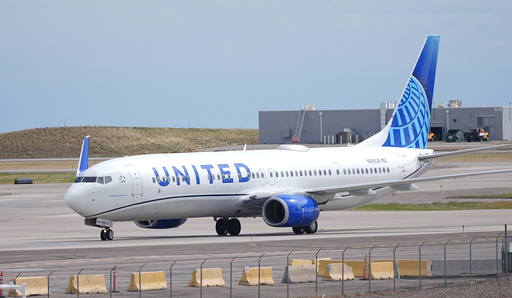United Airlines said Tuesday that it lost $124 million in the first quarter, which it blamed on a three-week grounding of all Boeing 737 Max 9s after a panel blew off an Alaska Airlines Max jetliner in January.
United indicated it would receive far fewer new planes from Boeing this year than it expected, and it has begun leasing Airbus jets to fill out its fleet.
Financial results released by the airline pointed to continued strength in demand for air travel, especially within the United States and across the Atlantic. United forecast better-than-expected profit in the second quarter.
Shares of United rose 5% in after-hours trading.
The airline had its own difficulties in the first three months of the year. Its CEO reassured travelers that United is safe despite a series of events that included a piece of aluminum skin falling off one plane, a tire dropping off another during takeoff, and an engine fire. The Federal Aviation Administration stepped up its oversight of the carrier.
United was hobbled during most of January by the temporary loss of its 79 Max 9 aircraft. The airline was forced to cancel hundreds of flights and switch planes on many others.
United said the grounding cost it $200 million — enough to turn a small profit into a loss for the quarter.
Alaska, the only other U.S. carrier using the Max 9, has reported getting $160 million in “initial compensation from Boeing for the grounding. A United official declined to discuss negotiations with the aircraft maker.
Boeing’s difficulty in producing and delivering Max jets means that United now expects to receive 61 of them this year, down about two-thirds from a few months ago. United has already asked its pilots to volunteer for unpaid time off next month and could extend that request into the fall because of a shortage of planes.
Investigations into the blowout on the Alaska jet are expected to further delay Boeing’s launch of a new, larger model, the Max 10, which United had ordered. Instead, United said it will lease 35 Airbus jets that will show up in 2026 and 2027. United has also asked Boeing for Max 9s in place of some of the Max 10s it ordered.
“We’ve adjusted our fleet plan to better reflect the reality of what the manufacturers are able to deliver,” CEO Scott Kirby said.
Chicago-based United Airlines Holdings said that excluding special items it lost 15 cents per share. Analysts on average expected a loss of 58 cents per share, according to a FactSet survey.
Revenue rose nearly 10%, to $12.54 billion, beating the Wall Street forecast of $12.45 billion.
United forecast that it will earn between $3.75 and $4.25 per share in the second quarter, which would top analysts’ average prediction of $3.73 per share.
This website uses cookies so that we can provide you with the best user experience possible. Cookie information is stored in your browser and performs functions such as recognising you when you return to our website and helping our team to understand which sections of the website you find most interesting and useful.
